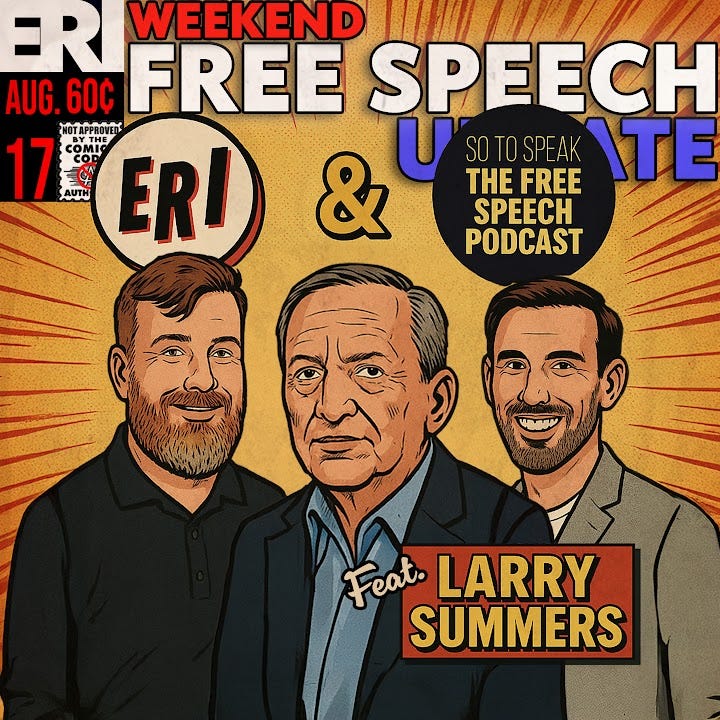The gang sits down with Larry Summers, FIRE & Cosmos announce AI truth-champions, ERI turns 2, & more!
Bringing you the latest free speech news (8/17/25)
Story of the week
FIRE Reacts — Where does Harvard go from here? With Larry Summers (in collaboration with So To Speak)
We want to support a future where AI works as a partner in truth-seeking. Where it surfaces counter-arguments, flags open questions, and prompts us to check the evidence. Where errors are chipped away and knowledge grows. Where our freedom and habit to question stays intact and even thrives.
That’s why in May, Cosmos Institute and the Foundation for Individual Rights and Expression (FIRE) launched a $1M grants program for AI projects that promote truth-seeking.
This week in ERI
This week in Expression
The sanctions against him not only sent him back to homelessness, but cost him work too, including a federal work-study opportunity that should have been protected from administrative meddling. “I was hired to be an orientation mentor at the end of last summer,” says McNicholas. “And the day before I was going to start, I got a call from the director of that program who said, ‘Yeah, you can’t participate because you’re on institutional probation.’”
This week on So to Speak
This week in FIRE’s blog
London Calling: Ronnie’s First Amendment Roundup
Contrasting First Amendment approaches to government efforts to dictate classroom teaching
This week saw diverging opinions on successive days regarding the constitutionality of state and federal attempts to regulate assertedly “divisive” concepts or ideologies in classrooms. First, the federal court for the Northern District of Alabama declined to issue a preliminary injunction on a challenge by public university faculty and students and the Alabama NAACP to Alabama's "divisive concepts" law—which among other things bars public schools, including colleges and universities, from requiring students to assent to a laundry list of “divisive concepts” centered on race, color, religion, sex, ethnicity, or national origin—reasoning that classroom presentation by faculty is “government speech” the First Amendment does not protect. The decision is the first in the nearly two decades since Garcetti v. Ceballos to apply that case’s reasoning to university faculty despite Garcetti’s indication it did not reach scholarship or teaching—and as such is at odds with cases from the Second, Fourth, Fifth, Sixth, Seventh, and Ninth Circuits recognizing Garcetti’s exception. As Greg points out, if the Alabama court’s rationale stands, it would eviscerate academic freedom as a legal protection at public universities. Meanwhile, the federal district court in Maryland held unlawful and vacated a “Dear Colleague Letter” the Department of Education issued this past February that stated the administration’s positions with respect to DEI (diversity, equity, and inclusion) principles—including (among other things) proscribing specific types of classroom speech. In that respect, the court held, the Letter violated the First Amendment by regulating based on content in singling out instruction about “systemic and structural racism” and “teach[ing] students that certain racial groups bear unique moral burdens that others do not,” which “improperly terms those categories … ‘discriminatory,’ ‘stereotyping,’ and ‘stigmatizing’—all terms that can give rise to enforcement under Title VI.” As such, despite the government’s protests that its Letter did not reach speech or academic freedom, it stands as “textbook viewpoint discrimination” and is thus unconstitutional (which could not be so were classroom instruction government speech).
Also of note: In NetChoice v. Fitch, the Supreme Court refused to lift the Fifth Circuit’s stay of the trial court’s preliminary injunction that found likely success on a First Amendment challenge to Mississippi’s social media age-verification law. Justice Kavanaugh concurred to note that, even though “NetChoice has, in my view, demonstrated … that enforcement of the Mississippi law would likely violate its members’ First Amendment rights under this Court’s precedents”—as FIRE argued—somehow it “has not sufficiently demonstrated that the balance of harms and equities favors” keeping the PI intact rather than allowing enforcement of the law during further litigation of the case. How that can be so—under settled precedent that likely success on the merits of a First Amendment challenge means irreparable harm is presumed, a strong public interest in upholding constitutional rights, and no governmental interest in enforcing an unconstitutional law—is anybody’s guess.
International free speech stories of the week
Toronto Film Fest outrageously cuts Oct. 7 doc because Hamas didn’t give footage permission: ‘Absurd and bizarre’ (NY Post) by Johnny Oleksinski
Wikipedia loses challenge against Online Safety Act verification rules (BBC) by Chris Vallance
The Wikimedia Foundation - the non-profit which supports the online encyclopaedia - wanted a judicial review of regulations which could mean Wikipedia has to verify the identities of its users.
But it said despite the loss, the judgement "emphasized the responsibility of Ofcom and the UK government to ensure Wikipedia is protected".
UK police arrest 466 people at Palestine Action protest in London (Al Jazeera)
Hamilton city hall heads to court after its removal order of digital billboard deemed ‘transphobic’ (CHCH) by Jason Gaidola
Qatar cybercrime law amendments raise press freedom concerns (CPJ)
In a first, Argentinian lawmaker indicted for anti-Israel social media posts (Times of Israel) by Juan Melamed
Podcast of the week
I was delighted to join Adam Taggart on his “Thoughtful Money” podcast to talk about the themes of Coddling, the book’s impact, and possible solutions to the many problems facing higher ed and society writ large.






